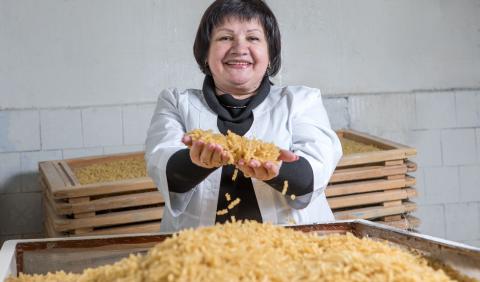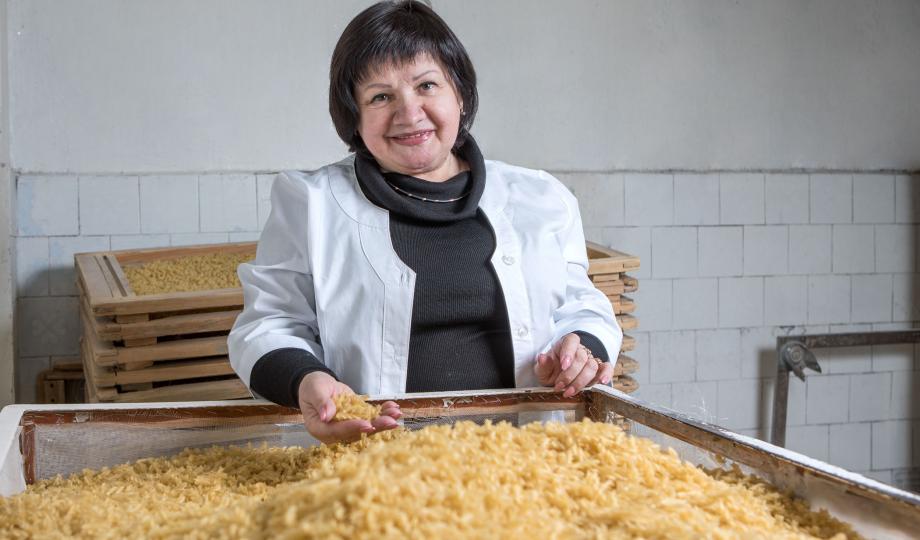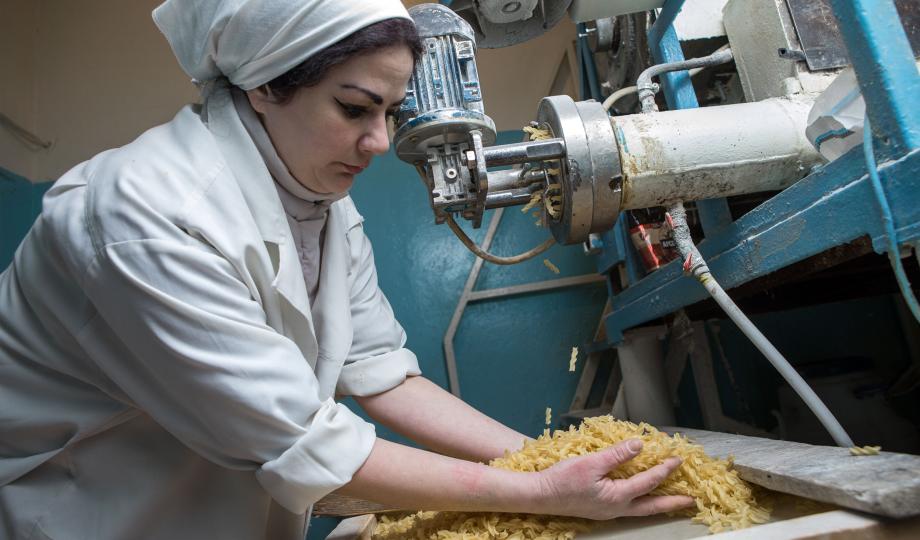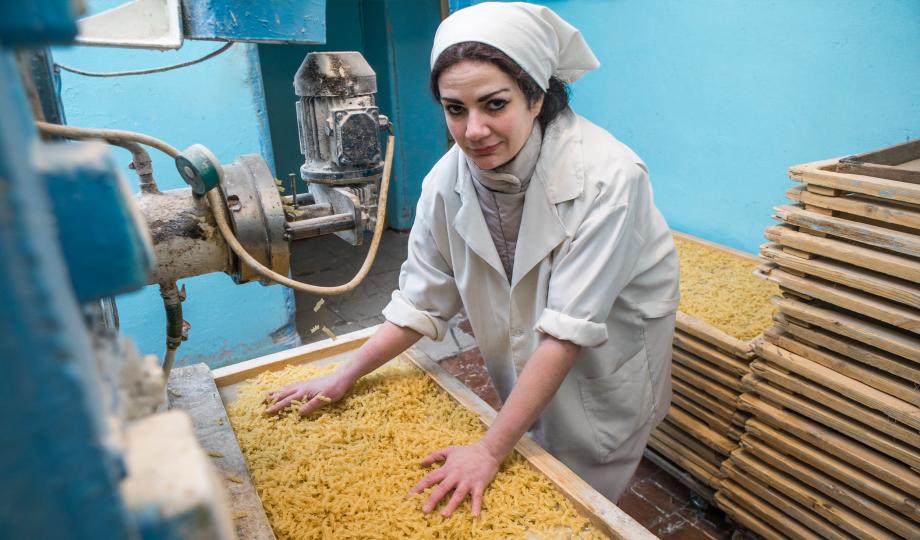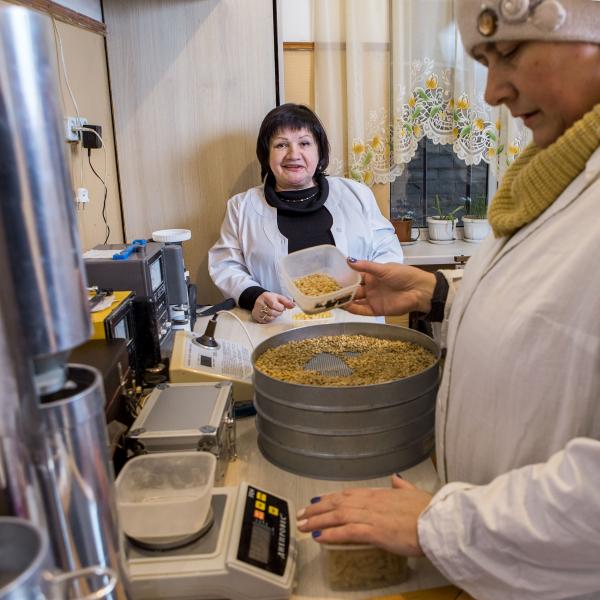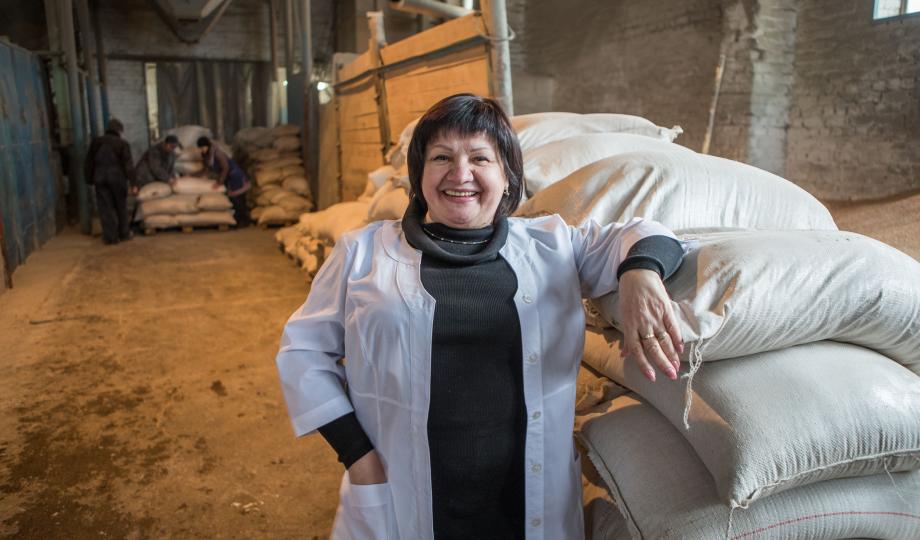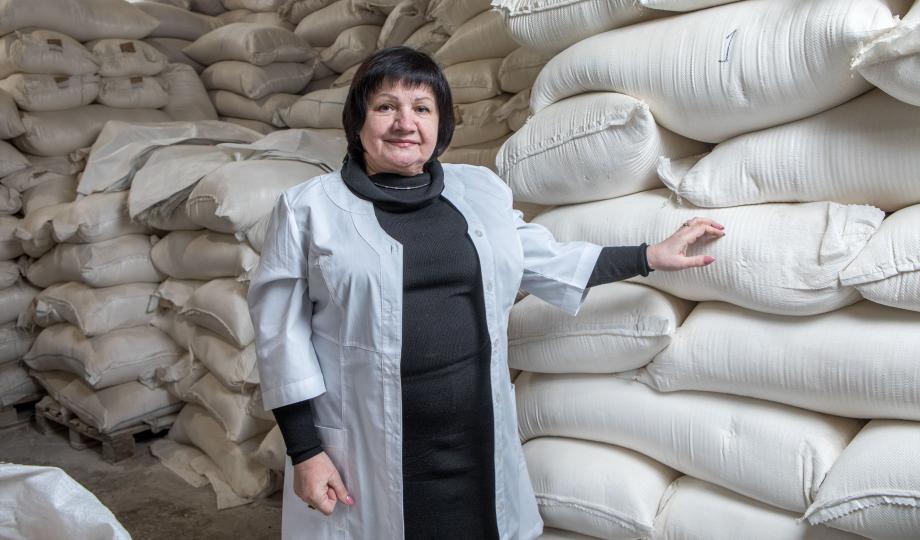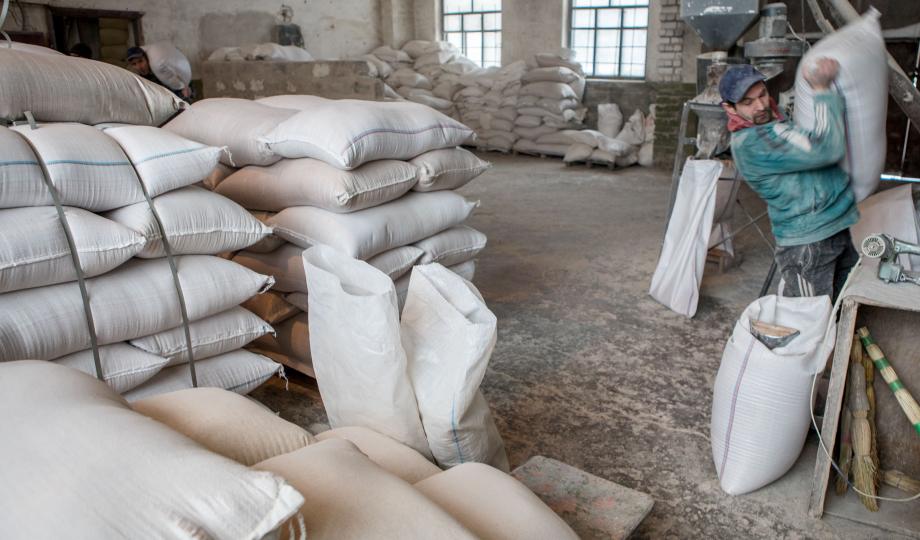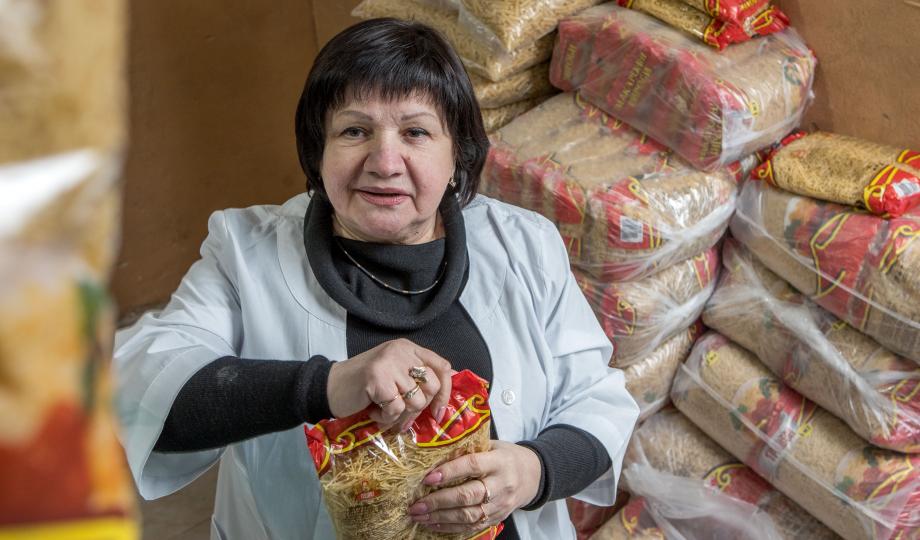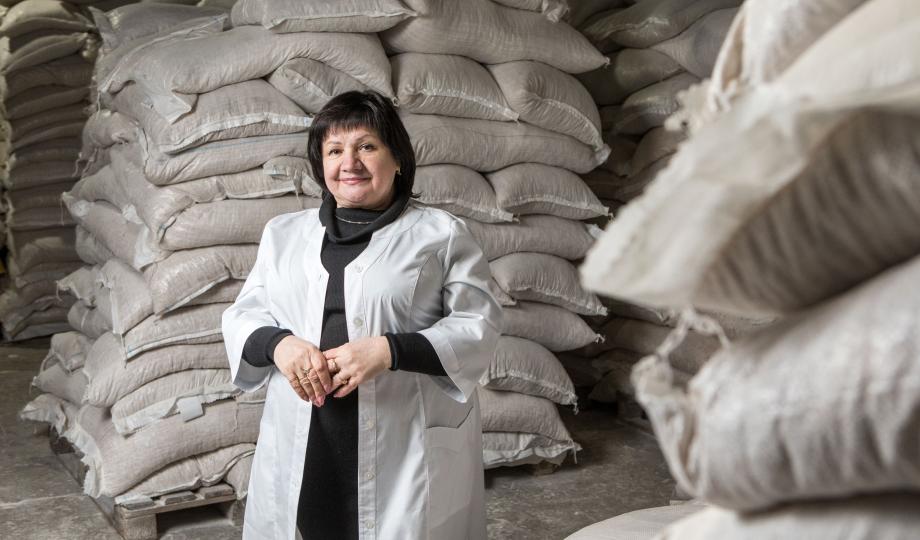Thousands of Ukrainian entrepreneurs dream of becoming suppliers of large retail chains in order to have guaranteed business. Tetiana Yaremchuk managed this challenge, and is now working on delivering her products to the EU.
Tetiana Yaremchuk meets the journalists at the station in the city of Dnipro, sitting at the wheel of a white jeep. Dodging numerous potholes, the diminutive businesswoman confidently drives her large car, taking us to her company in the small town of Verkhnodniprovsk.
Her company, SamRiz, turns out almost a thousand tonnes of flour, cereals and pasta every month. She sells all this to major retail chains in Ukraine, including ATB, the leader on the Ukrainian retail market, known for its tough approach to the quality and price of procured products.
To achieve such results, Tetiana has had to overcome many challenges – from attempts to close her business, to crises in the Ukrainian economy, and deceitful suppliers. “These are not difficulties,” the businesswoman smiles, talking, for example, about a tough tax audit. “These are tasks that I have to deal with.” She believes that if something does not work out, it means that she has not done enough and she only has herself to answer to.
Tetiana’s business ethics are rooted in her childhood. Orphaned at the age of 15, she realised then that she was the master of her own destiny, and that her success depended only on her own efforts. Back then she survived by selling the fruit from the family garden in the market. She recalls how she collected 21 crates of apples and brought them to sell in Leningrad, now St. Petersburg. “These earnings let me study for a year and bought me a pair of boots and a coat,” Tetiana says.
She studied at the technical college, majoring in bread-making and confectionery technology. After that she took a distance learning university course on the same subject. The food industry education came very handy when Ukraine became independent and began to develop its own market economy. In the planned Soviet economy, foodstuffs used to be produced only by state factories, whereas after the collapse of the USSR, private entrepreneurs had the right to produce. Tetiana was one of them, opening a small bakery. By that time, she had already worked for many years as the technical director of a bread factory in Dnipropetrovsk (currently Dnipro), a city with almost a million residents.
Tetiana tells her story in an interview on her way to her small enterprise, carefully and confidently driving her big white SUV on bad Ukrainian roads. I asked about her first private business.
“How did you open your mini-bakery?”
“It was by accident. In 1999, when I was still working at a bread factory, my friend asked me to help her out. She had opened a joint business – a bakery – with some Turks, and she found she could not work with them. So she asked me to buy out their share.
That was how I bought into SamRiz. I am often asked, ‘What does this word mean?’ Actually it is merged from the names of two Turkish cities – Samsun and Rize, that’s where the founder of the company lived and was born.”
“How did your small private bakery manage to compete with the large bread factories; they held the bulk of the market share after all?”
“We baked the same bread and rolls as the bread factories. But being private traders, we were more flexible. We allowed shops to pay with a deferment. We made free deliveries and we had a flexible pricing system. We gave discounts to those who ordered more. The state bread factories did not have this.
But when these enterprises became private, they also began to apply these practices, so our products became uncompetitive. The factories could offer bread of higher quality. So I closed the bakery, sold all the equipment.”
“And how did the pasta come?”
“Also by accident. An acquaintance who had a small food factory, complained that he could not sell the product – 20 tonnes of pasta. I took it and went to the ATB supermarket chain. It was small then, only 70 or 80 stores, and they signed a supply contract with my company. Then, after a while, my partner came and told me, ‘I can’t make pasta, my partners took away the equipment.’
But I had made a contract! And the penalties were hefty! I had to do something quickly, so I started to buy and resell other people’s pasta.
Then I rented a pasta factory with a mill, and then I bought and started my own production.”
“What was the most difficult thing in this story?”
“There was one difficulty. But I do not really think it was a problem, more of a working issue. Before the crisis of 2008, we took out three foreign-currency loans to buy land and equipment. We borrowed at the rate of 4.6 hryvnias per US dollar, and we had to repay when the value of national currency fell by 4-5 times.
Inflation hit us full force. My banker at one of the banks told me that there was an opportunity to refinance in hryvnia. We waited for the decision from the head office for three months, just to see the exchange rate soar from 12 hryvnia per dollar, to 16. In the end, I was refused. When I asked my banker why, she told me that their thinking in Kyiv was like, ‘Yaremchuk has the means to pay, let her pay’.
I have paid off two loans now. But let me say again – it was not a problem, just a working issue. And I look at it with gratitude, because it helped us become stronger.
And I never even allowed a thought of failure. I always ask myself, what can I lose? Money. But that can always be earned back.”
“Now many Ukrainian companies have entered the EU market. Do you plan to export your products to Europe?”
“Of course! The EU is a huge new market after all, and it is very good for a manufacturer. Just yesterday we had talks with some businessmen from Bulgaria. The other day we sent samples of our penne pasta to potential customers. So if everything goes well, we will supply cartons of pasta to hotel chains in Bulgaria.”
“Well, Ukrainian products are very competitive in Europe in terms of price.”
“Not only price, but also in terms of quality, we are on a par. Our products are no worse than those produced in the EU!
The only thing that restricts us a little now is the lack of production capacities. We are looking for an opportunity to get a loan or a grant from a European bank.
I think there is such an opportunity for us out there. Back in 2010, we received 50,000 hryvnias as part of the EU4Business programme. We were going through hard times back then. Feedstock had become more expensive, so we were having to buy at those higher prices. And there was no money left to pay the workers.
As I was looking for money, I found that the Ukrainian ProCredit Bank was lending to Ukrainian SMEs under the EU4Business programme. I took out an unsecured loan to replenish the working capital. I received it quickly and without any red tape, and I was treated with respect. When we came out from that bank with my accountant, we felt so happy!
Part of that loan immediately went to pay the salaries and we bought feedstock with it. Six months later we took a new loan, and now we have a small credit line.”
“How actively are entrepreneurs in your region using the EU4Business opportunities?”
“I do not know about many others, but, for example, upon my recommendation, the head of the company Gossnab also received such a loan for his business. And he uses the money.”
“We are talking with you on the eve of 8 March, the day symbolic of women's struggle for their rights. Could you tell me from your experience whether doing business in Ukraine is more difficult for women than for men?”
“It's easier for women in business. They have a better gut feeling and intuition. Success in business also depends on motivation and commercial talent.”
“However, Ukraine is a patriarchal society, the woman is perceived as the home keeper. Have you encountered any prejudiced attitude toward yourself, like, ‘your place is in the kitchen, and not running around solving serious problems’?”
“On the contrary, people cannot fathom me in the kitchen. A friend of mine once admitted that he just cannot imagine me getting busy around the house.
Even relatives call me Tetiana Ivanivna.”
“In the middle of last century, Charlotte Witton, the mayor of Ottawa said, ‘Whatever women do, they must do twice as well as men to be thought of half as good.’ Do you agree with this?”
“That’s very true! Partners outside of my business, that is partners in life, they don’t take me very seriously. And I work both at work and at home. If he’s a man, he has his meal and goes to bed. And I still have a lot to do. I still have to cook, shop for groceries, drive grandchildren to their training and classes. And I'm still a woman. I need to look good. And this also takes time.”
“Do you think it is right?”
“I'm coping. Actually, it’s a very good feeling, when I have tonnes of stuff to do, but I manage it all. A great sense of accomplishment. Tired, but pleased. It’s so cool!”
Tetiana received loans from ProCredit Bank, a Ukrainian partner of the European Fund for South East Europe (EFSE). As part of the EU4Business initiative, EFSE aims to support economic development through the sustainable provision of development finance to small businesses, via qualified local financial institutions like ProCredit Bank in Ukraine.
Interview with Tetiana Yaremchuk was produced for EU4Business by Kateryna Shapoval

